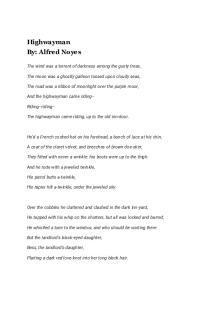Abolition of Man Summary PDF

| Title | Abolition of Man Summary |
|---|---|
| Author | Dimitrios Pettit |
| Course | Western Civ To 1648 |
| Institution | University of Alabama |
| Pages | 3 |
| File Size | 77.5 KB |
| File Type | |
| Total Downloads | 110 |
| Total Views | 175 |
Summary
gfg4t22gqgklntb j bbitv4bj gbjogr 2jon fejogrjo gjovt4j grbj...
Description
Dimitrios Pettit UNV-109HN Dr. Olson October 9, 2020
Summary of Chapter 3 of The Abolition of Man by C.S. Lewis
In the first paragraph, he begins to talk about how “Man’s Conquest of Nature” is what describes the progress of applied science and how a sense of humanity holds power over nature (para. 1). In this paragraph, he says that if you can afford something, you have power over nature but if you pay someone else to do something for you, then in reality, you are not a strong man (para. 2). There is a power of majorities and minorities, all have power over nature, but they don’t all have power over each other (para. 3). Every generation of man believes that they have power over their successor; however, the predecessors have different sort of powers when it comes to their traditions (para. 4). In this paragraph, he says how Man’s Conquest of Nature really means having control over yourself (para. 5). This paragraph is about how values have become a natural phenomenon and that these judgements of value will be part of the conditioning (para. 6). The conditioners are the motivators who motivate others, but they must now learn how to motivate themselves (para. 7). In this paragraph, he begins to talk about how the conditioners are looked at as bad men, but in fact, the author doesn’t even consider them a man at all (para. 8). He goes on to say that all motives of the conditioners fail them except one; the one that doesn’t fail them is their own emotional weight (para. 9). He then starts to say that nature, which is untrammeled by values, is what truly rules the conditioners (para. 10). The author begins to say that nature can be
hard to understand because of its multiple meanings; however, it is easier to understand if you give its opposites like artificial (para. 11). He begins to say that we can describe nature as what we conquest because the more we conquest, the more we change just like nature is constantly changing (para. 12). He begins to say that nature is always changing in one way or another and it will continue to do this (para. 13). He starts to say how traditional values have begun to get debunked and they are slowly going away as time goes by (para. 14). He says that the power of man can be truly defined as one having self-control of himself (para. 15). He goes on to say that what he has said throughout the text will seem like a true attack on science and nothing that he says will change this opinion about people (para. 16). He describes how he wants his thinking of science to become publicized because he has seen it in a different way and explained nature as a way of conquesting things (para. 17). He ends his text by saying that we should all try to see things through our own way, we should shy away from what is commonly known and try to do things are own way so that we can be different from one another (para. 18).
References Lewis, C. S. (1947). The Abolition of Man. The MacMillan Company. file:///C:/Users/Dimitri/Downloads/Lewis%20%20Abolition%20ch3%20due%20Tue %2006%20Oct%20(4).pdf....
Similar Free PDFs

Abolition of Man Summary
- 3 Pages

Abolition of intermediaries
- 1 Pages

Summary of the Gingerbread man
- 1 Pages

Age of man - Age of Man
- 3 Pages

Summary An Essay on Man
- 1 Pages

The Mismeasure of Man
- 2 Pages

Themes of 10th man
- 5 Pages

Man is the measure of all things
- 1 Pages

Highway man
- 8 Pages
Popular Institutions
- Tinajero National High School - Annex
- Politeknik Caltex Riau
- Yokohama City University
- SGT University
- University of Al-Qadisiyah
- Divine Word College of Vigan
- Techniek College Rotterdam
- Universidade de Santiago
- Universiti Teknologi MARA Cawangan Johor Kampus Pasir Gudang
- Poltekkes Kemenkes Yogyakarta
- Baguio City National High School
- Colegio san marcos
- preparatoria uno
- Centro de Bachillerato Tecnológico Industrial y de Servicios No. 107
- Dalian Maritime University
- Quang Trung Secondary School
- Colegio Tecnológico en Informática
- Corporación Regional de Educación Superior
- Grupo CEDVA
- Dar Al Uloom University
- Centro de Estudios Preuniversitarios de la Universidad Nacional de Ingeniería
- 上智大学
- Aakash International School, Nuna Majara
- San Felipe Neri Catholic School
- Kang Chiao International School - New Taipei City
- Misamis Occidental National High School
- Institución Educativa Escuela Normal Juan Ladrilleros
- Kolehiyo ng Pantukan
- Batanes State College
- Instituto Continental
- Sekolah Menengah Kejuruan Kesehatan Kaltara (Tarakan)
- Colegio de La Inmaculada Concepcion - Cebu






